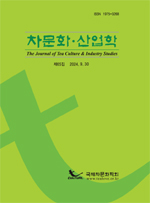명대는 은일문인들에 의해 아속(雅俗)을 구별짓는 풍취를 즐기는 심미취향이 문화 전반에 걸쳐 세심하게 반영된 시기이다. 차문화에서도 아취(雅趣)를 지향하는 은일문인다도가 발생하였는데 명대 최초의 다서(茶書)인 주권(朱權) 『다보(茶譜)』는 은일문인다도의 시발점 역할을 하였다. 주권은 황족으로서 명철보신을 위한 유가의 처세적 은일과 도교에 심취한 학자로서 도가의 은일적 삶의 형태를 보이고 있다. 은일문인들의 삶의 특징을 말해주는 대표적인 단어는 ‘독(獨)’이다. 독을 즐기는 것을 ‘독락(獨樂)’이라고 한다. 차문화에서도 ‘독철(獨啜)’을 중시한다. 은자들은 음다의 형태에서 세속을 벗어나 유유자적하며 산수 경관이 정신세계의 일부가 되는 것을 지향하며 홀로 마시는 차를 즐겼다. 은일차문화에서 지향한 ‘독’은 오직 개인을 강조하는 사유로 ‘허정(虛靜)’, ‘염담(恬淡)’의 심경에 도달하여 자연의 법칙에 따르고 어떠한 것에도 침해받지 않는 자유와 독립을 얻어 경계의 밖에서 초연하게 노니는 것으로 도가의 ‘독’에 대한 사유이다. ‘독철’을 중시하는 찻자리의 형태는 은일을 추구하는 문인사대부들 중심으로 널리 유행하며 은일적 차문화인 문인다도 형성에 영향을 주었다.
The Ming Dynasty was a period in which the aesthetic preference for distinguishing between elegance(“a”, 雅) and vulgarity(“sok” 俗), particularly enjoyed by reclusive scholars, was meticulously reflected across various cultural domains. In tea culture, the emergence of a refined, scholar-oriented tea ceremony (“munin dado”, 文人茶道) was particularly notable. “Dabo”(茶譜), the first tea book of the Ming Dynasty written by “Jugwon”(朱權), played a foundational role in shaping this scholar's tea culture of reclusion. As a member of the imperial family, Jugwon embodied Confucian strategies for self-preservation (“myeongcheol bosin”明哲保身) while simultaneously embracing the Daoist ideal of reclusion, influenced by his deep engagement with Daoist philosophy. A defining characteristic of reclusive scholars' lives can be encapsulated in the term “dok”(獨), meaning solitude. The joy of solitude was known as “doknak”(獨樂, “solitary pleasure”), and in the context of tea culture, the practice of “dokcheol”(獨啜, “solitary tea drinking”) was highly esteemed. Recluses sought to escape the secular world, embracing the tranquility of nature as an extension of their inner spiritual world. They found pleasure in drinking tea alone, a practice that aligned with the Daoist concept of “dok”—a solitary state that emphasized individual contemplation, leading to a mindset of “heojeong”(虛靜, “emptiness and stillness”) and “yeomdam”(恬淡, “calm detachment”). Through this, they achieved harmony with natural principles, gaining an unassailable freedom and independence beyond worldly constraints. The tea-drinking rituals centered on “dokcheol” became widely popular among reclusive scholar-officials and significantly influenced the formation of “munin dado”, the refined tea culture of literati reclusion.
Ⅰ. 서론
Ⅱ. 『다보』에 나타난 독락(獨樂)의 은일 사유
Ⅲ. 독철(獨啜)과 은일 아취 차문화
Ⅳ. 결론
(0)
(0)
